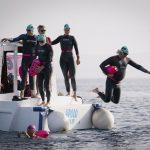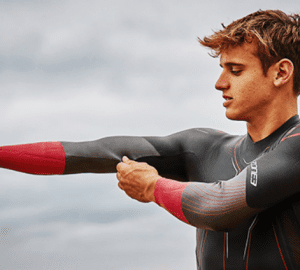“How do I prepare mentally for a race I can’t train for?”
Sports psychologist Helen Davis on techniques to stay motivated and positive for an event you can't train for.
SWIMMER: EMILY CARNEY
Emily Carney is 25 years old and lives in Worcester. Emily is an emergency department nurse. At time of writing, Emily’s hospital is working hard to prepare to receive more patients suffering from the coronavirus. During usual times, Emily does some training with her partner, but mainly trains alone in the pool and gym. She has a goal to compete semi-pro at 10K open water swimming.
THREE INTERESTING FACTS ABOUT EMILY
· Emily is hyper-mobile
· Emily is a twin
· Emily has swum the length of Lake Windermere
SWIMMING AND SPORTING BACKGROUND
Emily learnt to swim as a young child and swam for her primary school. She was part of a rookie lifeguard club but stopped swimming altogether seven years ago when she went to university. Since returning to swimming in October 2019, Emily has completed a 10K open water swim and was the fifth female in the one-way Windermere wetsuit 17.5K swim in a very fast time of time of 5 hours 34 minutes.
THE EVENT
Emily has entered a 17.5K race at the Alpen Adria Swim Cup in Wörthersee, Austria. This is part of the Global Swim Series which is a collection of 190+ races from over 38 countries around the globe. The event is due to be held in September 2020 and at present has not been cancelled. The race is known for its crystal-clear turquoise waters with an incredible backdrop of a mountain panorama. Her Mum, a novice swimmer, is due to swim in the 3K race.
EMILY’S CONCERNS
At the moment as Emily’s event is going ahead, so she is continuing to keep fit. She knows that the race might be cancelled and recognises that it’s hard to train for an event that might not happen. When Emily entered the event (before Coronavirus) she felt ‘silly and underprepared’ and ruminated about all the things that might go wrong in the lead up to the race. Not being able to swim in water was not what she imagined when she entered the event.
HELEN SAYS…
When Emily originally entered her race, she found herself obsessing’ over her routine, body, nutrition and ‘little niggles’ that come with regular training. Now, her biggest challenge is not being able to train in water for such a long-distance event. Emily feels like everything has been ripped from under her feet and is upset that she might not be able to do the event with her Mum, who had been doing so well with her new skill of swimming frontcrawl.
STRATEGY: KEEPING CONTROL
Emily admits she sometimes feels completely overwhelmed by feelings of stress and anxiety and takes situations so far into her head that she can’t focus on the here and now. With the current Coronavirus, future thinking can be anxiety provoking and at the moment we have little clarity on what the future holds- for Emily she has this with her swim event and her job. A technique that can be useful for focusing on the present in the current climate is grounding. Grounding techniques help bring you to the present when your mind is racing and are very helpful for managing overwhelming feelings or anxiety. It’s a good way to calm down quickly. Grounding basically means bringing your focus to what is happening to you physically, either in your body or in your surroundings, instead of being trapped by the thoughts in your mind that are causing you to feel anxious. It helps you stay in the present moment instead of worrying about things that ‘might’ happen.
This grounding technique uses all five senses to get you back to the present. It starts with sitting comfortably and taking a few deep breaths: breath in for 4, hold for 2, and out for 6.
Then say out-loud or list mentally….
5 things you can see
4 things you can feel/touch
3 things you can hear
2 things you can smell
1 thing you can taste
Finish with three more deep breaths.
STRATEGY: MAINTAINING MOTIVATION
Emily’s event is her ‘big push’ she is worried that her motivation will dwindle as she can’t train in water at the moment and the possibility that her race could be cancelled. Here are three things that could help Emily with motivation.
1. Recognising what she can achieve during this period of not swimming
2. Setting new goals
3. Using self-talk effectively
Emily has made a great start to these three things already. She recognises that fitness plays a big part in her life now and she doesn’t want to get out of the habit, so she plans to exercise more with her partner. She wants to set some fitness goals and is using her self-talk effectively – here are some examples
“I really miss swimming, but I don’t usually focus on out of the water training, now is my opportunity to do this.”
“I know I can get back in the pool and know how to swim again. It will be alright as long as I keep my strength training going.”
A FINAL SAY…
Thank you and well done on all the work you are doing as an NHS worker from us all at Outdoor Swimmer.
Helen Davis is a swimmer and sport psychology consultant who works with individuals, teams and coaches on their sporting performance. Each month, Helen will suggest psychological techniques to help overcome difficult open water swimming scenarios.
@helenDav2245
Photo (c) James Kirby








